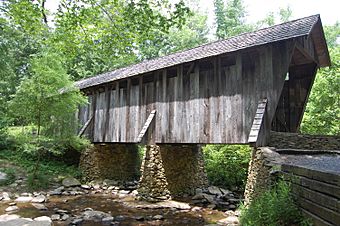Pisgah Covered Bridge facts for kids
Quick facts for kids |
|
|
Pisgah Community Covered Bridge
|
|
 |
|
| Location | Southeast of Pisgah on SR 1109 off SR 1112, near Pisgah, North Carolina |
|---|---|
| Area | 4 acres (1.6 ha) |
| Built | 1910 |
| Built by | Welch, J.J. |
| Architectural style | Modified queenpost truss |
| NRHP reference No. | 72000988 |
| Added to NRHP | January 20, 1972 |
The Pisgah Covered Bridge is a special wooden bridge in Randolph County, North Carolina. It crosses the west fork of the Little River. This bridge is one of only two original historic covered bridges left in North Carolina. It's recognized as an important landmark by both local and national groups.
Contents
Building the Bridge
The Pisgah Covered Bridge was built in 1911. A person named J. J. Welch constructed it. It cost only $40 back then! The bridge is 54 feet long and only wide enough for one car at a time.
Over time, more and more cars used the roads. The old bridge was not big enough for all the traffic. So, a new, wider concrete bridge was built nearby in the 1950s. The Pisgah Covered Bridge is now a fun place for visitors to see. You can find it at 6925 Pisgah Covered Bridge Road, near the community of Pisgah.
Keeping the Bridge Safe
Since 1998, many groups have worked together to take care of the bridge. These groups include the North Carolina Zoo Society, the North Carolina Department of Transportation, and local land trusts. They help make sure the bridge stays in good shape.
Rebuilding After a Flood
On August 9, 2003, a big flood washed the bridge away. But people in the area worked hard to save it! Volunteers collected most of the original wood and parts. The bridge was rebuilt the very next year. About 90 percent of the original materials were used again.
When the bridge was first built, it probably had a shingle roof. In the 1930s, this was changed to a tin roof. During the rebuilding after the flood, they put a shingle roof back on.
Visiting the Bridge
There is a gate on the road leading to the bridge. However, it is open to the public every day from morning until evening.
Sometimes, visitors have drawn or written on the bridge. This is called graffiti. It is important to remember that drawing on historic places is not allowed. It can damage the bridge and spoil it for others.
Things to See
There is a short trail near the bridge, about a quarter-mile long. This trail goes through the woods. You can walk across small footbridges and see a special pool downstream from the bridge.
 | Jessica Watkins |
 | Robert Henry Lawrence Jr. |
 | Mae Jemison |
 | Sian Proctor |
 | Guion Bluford |



